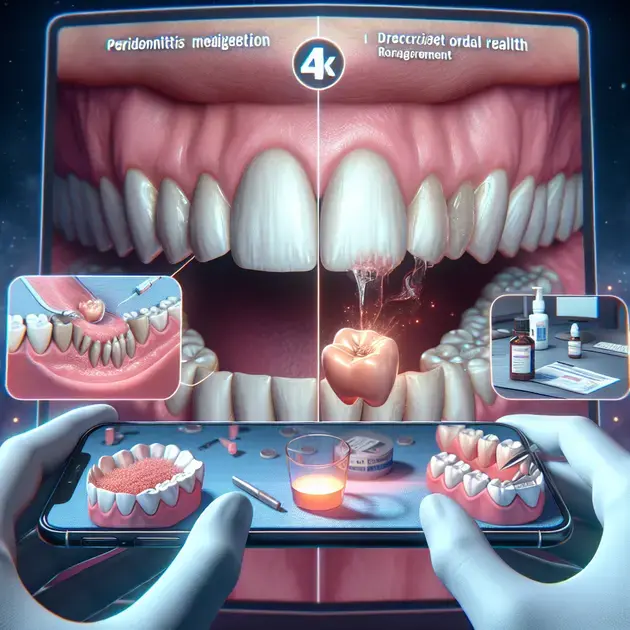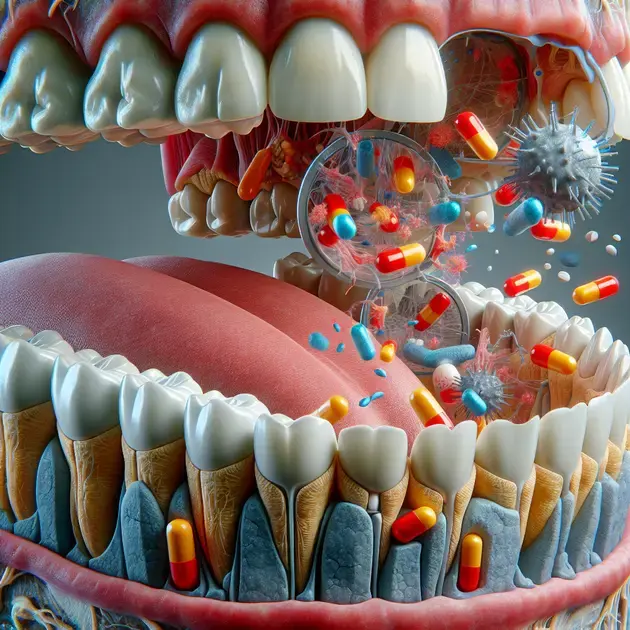Looking for effective medication for periodontitis? In this article, we will dive into what you need to know about treating this common but serious dental issue.
Periodontitis, an advanced stage of gum disease, can lead to tooth loss if left untreated. Learn about the different treatment options available and how they can help restore your oral health.

Understanding Periodontitis Treatment Options
When it comes to treating periodontitis, there are several options available to help manage the condition effectively. One key treatment option is professional dental cleanings, also known as scaling and root planing. This procedure involves removing plaque and tartar from the teeth and smoothing the root surfaces to promote healing.
Another treatment option for periodontitis is antibiotic therapy. This can be administered in various forms, such as oral antibiotics or antibiotic gels that are applied directly to the gums. Antibiotics help kill the bacteria causing the infection and control the disease.
Surgical interventions may also be necessary for advanced cases of periodontitis. Procedures such as flap surgery or bone grafting can help restore damaged tissues and bone structure in the mouth. These surgeries aim to reduce pocket depths and promote gum tissue regeneration.
Using an electric toothbrush and incorporating antimicrobial mouth rinses into your daily oral hygiene routine can also be beneficial in managing periodontitis. These tools and products help remove plaque effectively and reduce the bacteria responsible for the infection.
For more detailed information on periodontitis treatment options, websites like the American Academy of Periodontology (perio.org) provide comprehensive resources and guides on the various therapies available.
The Benefits of Effective Medication
Effective medication plays a crucial role in the treatment of periodontitis, offering several benefits to patients dealing with the condition. One significant advantage of using medication is its ability to target and control the specific bacteria causing the infection in the gums.
Antibiotics prescribed by dentists can help reduce inflammation and promote healing in the affected areas. They work to combat the bacterial buildup in the pockets around the teeth, preventing further damage to the gums and supporting the overall health of the mouth.
Anti-inflammatory drugs are also commonly used to manage the symptoms of periodontitis, such as swelling and discomfort. These medications help alleviate pain and reduce the inflammatory response in the gums, leading to improved comfort for patients undergoing treatment.
Medications like chlorhexidine mouthwash can be effective in reducing plaque and gingivitis, two key factors contributing to the progression of periodontitis. Regular use of these products can help maintain oral health and prevent further complications associated with gum disease.
Online platforms like the National Institute of Dental and Craniofacial Research (nidcr.nih.gov) offer valuable insights into the benefits of using medication in periodontitis treatment and provide recommendations for appropriate drug therapies.
Keys to Successfully Managing Periodontitis
Successfully managing periodontitis involves a combination of consistent oral hygiene practices and regular professional care to control the disease and prevent its progression. One key aspect of managing periodontitis is maintaining a thorough daily oral hygiene routine, including brushing and flossing to remove plaque and bacteria from the teeth and gums.
Scheduling regular dental check-ups and cleanings with a qualified periodontist is essential for monitoring the status of the disease and addressing any concerns promptly. These visits allow for early detection of potential issues and the implementation of appropriate treatment strategies.
Adopting a healthy lifestyle that includes a balanced diet and avoiding harmful habits like smoking can significantly impact the management of periodontitis. Nutrient-rich foods support overall oral health, while quitting smoking can improve healing and reduce the risk of complications associated with gum disease.
Practicing stress-reducing techniques like meditation or yoga can also benefit individuals dealing with periodontitis, as stress can weaken the immune system and exacerbate the condition. Managing stress effectively can help maintain a healthy immune response and support the body’s ability to combat infections.
Utilizing resources like the Centers for Disease Control and Prevention (cdc.gov) can provide valuable tips and guidelines for successfully managing periodontitis and maintaining optimal oral health in the long term.

Role of Effective Medication in Periodontitis Management
Effective medication plays a crucial role in the management of periodontitis, a serious gum infection that damages the soft tissue and destroys the bone that supports your teeth. When it comes to treating periodontitis, medication can help control the infection, reduce inflammation, and promote healing. Antibiotics are commonly prescribed to target the bacteria causing the infection, while other medications may be used to manage pain and discomfort associated with the condition. By following your dentist or periodontist’s prescription and using medication as directed, you can effectively manage periodontitis and prevent further complications.
In addition to antibiotics, antimicrobial mouth rinses may also be recommended as part of the medication regimen for periodontitis management. These rinses can help reduce the bacteria in your mouth and improve overall oral hygiene. When used in conjunction with professional dental cleanings and regular brushing and flossing, medication can significantly enhance the effectiveness of your periodontal treatment. It is important to follow your dentist’s instructions carefully and attend regular follow-up appointments to monitor your progress and adjust your medication regimen as needed.
The role of effective medication in periodontitis management cannot be overstated. By using the prescribed medication consistently and incorporating it into your overall oral health routine, you can effectively control the progression of the disease and prevent tooth loss. Remember that medication alone is not a substitute for proper oral hygiene practices and professional dental care. It is essential to maintain a comprehensive approach to periodontitis management, combining medication with regular dental visits, good oral hygiene habits, and a healthy lifestyle.
Overall, the proper use of medication is a key component of successful periodontitis management. By working closely with your dental care team and following their recommendations, you can optimize the effects of medication and improve the health of your gums and teeth. Take control of your periodontal health by prioritizing proper medication adherence and maintaining a proactive approach to managing this common dental condition.
Understanding the Impact of Medication on Periodontal Health
Medication plays a significant role in influencing periodontal health and can have a profound impact on the progression of gum disease. By understanding how different medications affect your oral health, you can make informed decisions about your treatment options and work towards improving the overall health of your gums. Certain medications, such as antibiotics and antimicrobials, are specifically designed to target the bacteria that cause periodontitis, helping to reduce inflammation and promote healing in the gums.
It is essential to discuss any medications you are currently taking with your dentist or periodontist, as some drugs can have side effects that impact your oral health. For example, certain medications may cause dry mouth, which can increase your risk of periodontal disease by reducing saliva production and creating an environment conducive to bacterial growth. By being aware of the potential effects of your medication on your periodontal health, you can take proactive steps to mitigate any negative consequences.
In some cases, medications prescribed for other health conditions can inadvertently affect your gums and oral tissues. For instance, blood pressure medications, antihistamines, and antidepressants may have oral side effects that impact the health of your gums. By understanding how these medications work and communicating openly with your healthcare providers, you can minimize any adverse effects on your periodontal health and maintain a healthy smile.
Overall, a comprehensive understanding of the impact of medication on periodontal health is essential for effectively managing gum disease and maintaining optimal oral hygiene. By staying informed about the medications you are taking, discussing any concerns with your dental team, and prioritizing good oral health habits, you can protect your gums and teeth from the detrimental effects of periodontitis. Take control of your oral health today by recognizing the role that medication plays in promoting healthy gums and a beautiful smile.
Maximizing Treatment Success with Periodontitis Medication
To maximize the success of your periodontitis treatment, it is essential to carefully follow your medication regimen and incorporate it into your daily oral care routine. Periodontitis medication, such as antibiotics and antimicrobial mouth rinses, can help control the infection, reduce inflammation, and support the healing process in your gums. By using these medications as directed by your dentist or periodontist, you can enhance the effectiveness of your treatment and improve your overall oral health.
In addition to taking medication, it is important to practice good oral hygiene habits, including regular brushing, flossing, and professional dental cleanings. These preventive measures can help remove plaque and bacteria from your teeth and gums, supporting the effects of your medication and promoting a healthy oral environment. By maintaining a consistent oral care routine and attending regular dental check-ups, you can maximize the success of your periodontitis treatment and prevent the recurrence of gum disease.
Another key aspect of maximizing treatment success with periodontitis medication is staying informed about the potential side effects and interactions of the drugs you are taking. Some medications may have oral side effects that can impact your periodontal health, so it is crucial to communicate any concerns with your healthcare providers and adjust your treatment plan as needed. By advocating for your oral health and staying proactive in your treatment, you can optimize the outcomes of your periodontitis therapy and enjoy a healthier smile.
Remember that periodontitis medication is just one component of a comprehensive treatment plan for gum disease. By combining medication with professional dental care, lifestyle modifications, and good oral hygiene practices, you can achieve long-term success in managing periodontitis and preserving the health of your teeth and gums. Take control of your oral health today by prioritizing your periodontal treatment and working collaboratively with your dental team to achieve the best possible outcomes for your smile.
Conclusion
In managing periodontitis, effective medication plays a vital role in controlling the infection, reducing inflammation, and promoting healing. Antibiotics and antimicrobial mouth rinses target the bacteria causing the infection, improving oral hygiene and treatment effectiveness. By following prescribed medication and oral care routines, one can prevent complications, tooth loss, and enhance gum health.
Understanding how medications impact periodontal health is crucial for informed decision-making and treatment efficacy. Discussing potential side effects with healthcare providers helps mitigate risks like dry mouth and other oral issues. Being proactive in managing medication effects from other health conditions ensures gum health is maintained, fostering a healthy smile and optimal oral hygiene.
To maximize periodontitis treatment success, adherence to medication regimen, good oral hygiene practices, and awareness of potential side effects are key. Incorporating medication into daily routines, along with regular professional dental care and lifestyle modifications, helps prevent recurrence of gum disease. By prioritizing periodontal treatment and collaboration with dental teams, long-term oral health and successful gum disease management can be achieved.



